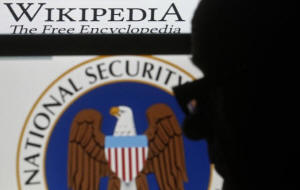|
Wikipedia can pursue NSA surveillance
lawsuit: U.S. appeals court
 Send a link to a friend
Send a link to a friend
 [May 24, 2017]
By Jonathan Stempel [May 24, 2017]
By Jonathan Stempel
(Reuters) - A federal appeals court on
Tuesday revived a Wikipedia lawsuit that challenges a U.S. National
Security Agency (NSA) program of mass online surveillance, and claims
that the government unconstitutionally invades people's privacy rights.
By a 3-0 vote, the 4th U.S. Circuit Court of Appeals in Richmond,
Virginia, said the Wikimedia Foundation, which hosts the Wikipedia
online encyclopedia, had a legal right to challenge the government's
Upstream surveillance program.
The decision could make it easier for people to learn whether
authorities have spied on them through Upstream, which involves bulk
searches of international communications within the internet's backbone
of cables, switches and routers.
Upstream's existence was revealed in leaks by former NSA contractor
Edward Snowden in 2013.
Lawyers for the Wikipedia publisher and eight other plaintiffs including
Amnesty International USA and Human Rights Watch, with more than 1
trillion international communications annually, argued that the
surveillance violated their rights to privacy, free expression and
association.

The U.S. Department of Justice countered that the Foreign Intelligence
Surveillance Act had authorized Upstream's review of communications
between Americans and foreign "targets."
In October 2015, U.S. District Judge T.S. Ellis III in Baltimore
dismissed the lawsuit, finding a lack of evidence that the NSA,
headquartered in Maryland, was conducting surveillance "at full
throttle."
Writing for the appeals court panel, however, Circuit Judge Albert Diaz
found "nothing speculative" about the Wikimedia Foundation's claims.
Diaz said the NSA interception and copying of communications showed "an
invasion of a legally protected interest - the Fourth Amendment right to
be free from unreasonable searches and seizures."
The foundation could also pursue its First Amendment claim because it
had "self-censored" some communications in response to the Upstream
surveillance, Diaz said.
[to top of second column] |

A man is silhouetted near logos of the U.S. National Security Agency
(NSA) and Wikipedia in this photo illustration taken in Sarajevo
March 11, 2015. REUTERS/Dado Ruvic/File Photo

By a 2-1 vote, the same panel also ruled the plaintiffs lacked standing
to challenge the NSA's alleged "dragnet" to intercept "substantially
all" text-based communications to and from the United States while
conducting Upstream surveillance.
Justice Department spokesman Mark Abueg declined to comment.
Patrick Toomey, an American Civil Liberties Union lawyer representing
the plaintiffs, said the ruling means Upstream "will finally face badly
needed scrutiny" in the courts.
"This is an important victory for the rule of law," he said in a
statement. "Our government shouldn't be searching the private
communications of innocent people in bulk."
Some Democratic and Republican lawmakers are working on legislation to
curtail parts of Upstream. A section of FISA that authorizes the program
expires at year end.
The case is Wikimedia Foundation et al v National Security Agency et al,
4th U.S. Circuit Court of Appeals, No. 15-2560.
(Reporting by Jonathan Stempel in New York; Additional reporting by
Dustin Volz in Washington; editing by Jeffrey Benkoe and Phil Berlowitz)
[© 2017 Thomson Reuters. All rights
reserved.]
Copyright 2017 Reuters. All rights reserved. This material may not be published,
broadcast, rewritten or redistributed.

 |